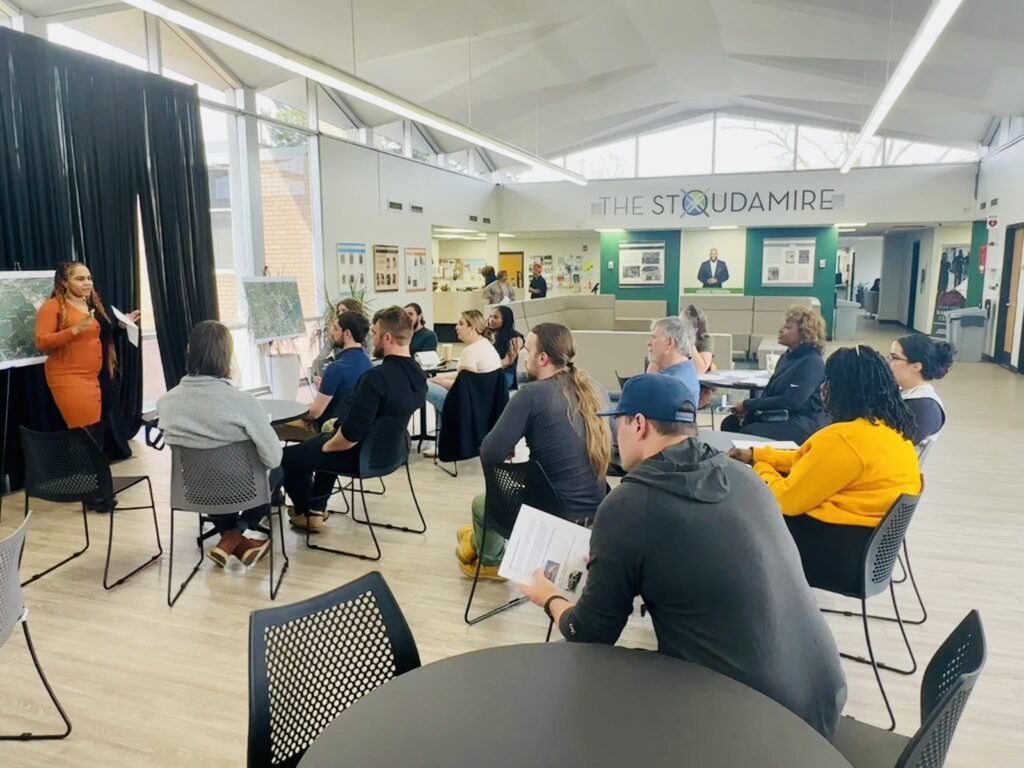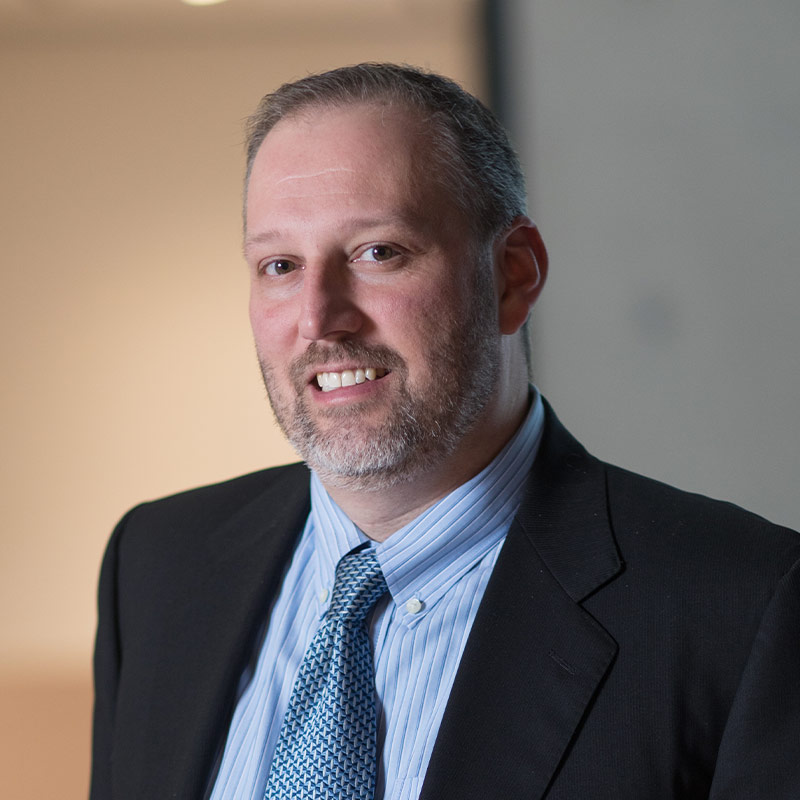Small Businesses Become Resilience Hubs in Eastside Detroit Communities

Elevate is a 24-year-old 501(c)(3) nonprofit focused on creating equitable and sustainable communities. Their areas of focus span energy efficiency, water, workforce development, and creating healthy and efficient homes and buildings in communities. Part of the work it is doing in Detroit is helping to develop resilience hubs in response to flooding and ongoing climate-related injustice issues. This is part of the Resilient Eastside Initiative (REI), a culmination of residents and organizations including the Eastside Community Network (ECN), The City of Detroit Office of Sustainability, and the Eastside Climate Action Coalition. Tim Skrotzki, associate director of partnerships at Elevate, and Terri O’Neal, project manager of community programs, talked with SBN Detroit about this work and the role businesses are playing. Q: What is the impetus behind Elevate? A: Elevate is a Chicago-based nonprofit formed in 2000 as an energy cooperative focused on energy efficiency and reducing the drag on the grid. We have projects that touch almost all states. Over the past twenty-four years, our work has expanded to include water, solar, electrification, environmental health, and workforce development. Q: How is Elevate supporting resilient and sustainable communities throughout Detroit and Southeast Michigan? A: One important initiative is the development of Resilience Hubs on Detroit’s East Side. Resilience hubs are vital community centers offering education, support, and resources while fostering community connections. These hubs – many of which are small businesses in the neighborhoods – serve as trusted spaces in touch with residents’ needs. They help facilitate coordination of resources and services across various stakeholders before, during, and after climate-related emergencies. These are being led by the Eastside Community Network and the Resilient Eastside Initiative (REI), a network of 12 resilience hubs on Detroit’s east side, which officially launched in August 2023 in partnership with The City of Detroit Office of Sustainability with funding from the Kresge Foundation. One of these spaces is The Commons, a café, laundromat, and community space that operates in MACC Development’s storefront space on Mack Avenue. This is a safe space for the community that offers charging stations, resources, and more for neighbors during power outages or emergencies. They are also training and upskilling local residents as a form of workforce development. Neighborhood Grocery is another hub, offering healthy food access, refrigerators, and charging stations to neighbors during power outages. This is a framework a lot of businesses can adopt to provide more resources for their communities. It’s an opportunity for businesses to think about where they fit into the community and how they can help the neighborhood remain resilient and sustainable. Further, part of the funding we received from Kresge is being used for training black contractors in solar and EV infrastructure. Called the Detroit Clean Energy Contractor Accelerator Program, the program helps create growth paths and lift up black and brown contractors to help them build their businesses. We believe that if we develop contractors in clean energy in Detroit they will then hire and train more Detroiters to work with them. Q: What best practices can you share from the sustainability work you do in terms of the business and community impact? A: There are federal incentives for businesses and buildings to become more energy efficient. It’s so easy to track what energy you are using and lower it. There are huge opportunities here that people are leaving on the table. Also, any business looking to grow and be sustainable has to be ingrained in the community. Providing resources that help the neighborhood become more resilient should be on every small business owner’s mind. Q What are trends you are seeing when it comes to the sustainability that impacts businesses? A: We are all dealing with new issues we have not dealt with before. Flooding, power outages from 100-year storms, and more. Making a building more resilient is extremely beneficial to business owners, so they don’t have to reduce hours or close during a flood or power outage. There are new impacts that climate change is driving, and if you are not thinking about how to make your business more resilient you may be losing money. Also, businesses should be and are becoming more involved in community organizations, meetings, and community engagement. It’s thinking about how they can better meet the needs of the community. Perhaps be a place where people can come during power outages and offer resources to support. And finally, all businesses should have a climate emergency plan on the operations side of things for their staff, and if applicable, their community. Be sure to subscribe to our newsletter for regular updates on sustainable business practices in and around Detroit.
Improved Green Loan Access for Detroit Small Businesses, Nonprofits, and Residents

In 2009, the State of Michigan created the nation’s first nonprofit “green bank” called Michigan Saves. The organization provides credit enhancements for credit unions and other lenders that reduce their loan default risk. In exchange, the lenders lower interest rates to help homeowners to pay for home improvements that reduce fossil fuel use, such as high-efficiency appliances like furnaces, central air, and water heaters. That means lower greenhouse gas emissions. Fast forward to 2022 at which time Michigan Saves secured a $2.5 million loan from the Kresge Foundation and developed the Detroit Loan Fund, fundamentally changing the loan process to approve more loans for residents, and now nonprofits and small businesses in Detroit. The fund eliminates credit scores as loan criteria, focusing instead on the borrower’s ability to make loan payments. In nine months, Michigan Saves through the fund has reached a $1 million milestone in loans. SBN Detroit talked to Todd Parker, vice president for Michigan Saves, about how the fund benefits residents, nonprofits, small businesses, the economy, and the environment. Q: How does this help nonprofits and small businesses in Detroit qualify for loans? A: Yes, especially in today’s financial environment with rising interest rates because the program provides 7% fixed-interest-rate loans and, therefore, financial certainty. The Detroit Loan Fund provides funding to Detroit nonprofits, community organizations, and small businesses for solar photovoltaic, battery storage, or electrification projects. The loans provide direct financial benefits in the form of utility savings and have longer terms than most commercial loans – seven to ten years. Customers may also be eligible for federal tax credits, which further improves the business case for the loan. In all, the loan provides great terms and affordable funding for those who have not been able to receive it before. Q: Is this model of lending unusual? A: Yes. Regarding the residential component, we are focusing on the ability of the loan recipient to pay, and not simply their credit score. Very few, if any lenders do this. Commercial lending is more competitive. A 7% loan in this environment that does not rely on credit criteria is innovative. We tried to develop these programs to fill a market niche and do something other lenders are not. Q: What was the path to creating these loans? A: These loans were developed because we analyzed the loan application denial rate and saw that Detroit homeowners are denied twice as much as others in Wayne County. This systemic inequity has been baked into the credit process for years. We knew something had to be done. Detroit has been underserved for years and a loan product like this opens many doors for the betterment of the city. The concept could work statewide as well. Q: Is the intention to go statewide with these loans? A: If funding comes through yes, we’d like to expand statewide. Rolling it out in Detroit allowed us to test it, and it’s been very successful. Q: From the residential perspective, how does assisting those who have been denied previously in getting loans for energy efficiency programs help the overall communities? A: The program is designed to target customers who have the highest energy burden. Those who are paying the most for energy relative to their income. Old homes lack insulation and lack quality windows and high-efficiency heating and air. The loans allow people to reduce their utility bills but also improve the health and safety and comfort of their homes. Providing comfort and savings is our goal. Q: It also helps the environment, yes? A: Yes. It certainly helps reduce greenhouse emissions and the carbon footprint. On the commercial side, the nonprofit and small business program targets solar PV (photovoltaic) systems, which allows them to generate energy and put it back on the grid as well as get bill credits, so there are environmental and financial benefits there as well. Q: What are the criteria for accessing these loans? A: The criteria are simple. Small businesses or nonprofits simply need to demonstrate they can pay by showing cash flow. We are less focused on traditional underwriting criteria. And more focused on a holistic view to make sure they have the means to repay. Q: What else do we need to know? A: The loan programs are contractor driven, meaning they are promoted through our network of authorized contractors. Also, we get referrals from utilities like DTE, community action agencies, or other community groups. Ultimately the nonprofit or business will then enter into a direct relationship with the lender. Q: How does the lending process with businesses impact nonprofits? A: These types of measures are being heavily incentivized through the Inflation Reduction Act. It’s an exciting component for nonprofits, who don’t have to pay taxes and therefore cannot take advantage of tax credits. The IRA legislation changed the game by saying nonprofits are eligible for direct pay equivalent of a tax credit when they invest in solar PV or battery storage systems. This changes the financial picture and opportunities dramatically and provides a direct financial incentive for nonprofits. Q: How do you see it impacting the future of Detroit and the economy? A: Our funding will be exhausted this summer. If we get additional funding to continue the program, we will be able to help significantly more homeowners. Currently, we are already approaching 250 projects. On the commercial side, once the federal government releases guidance and more funding, we expect nonprofits and businesses to package this funding with federal grants and tax credits to make the projects more financially attractive. The loans also help customers deploy energy-saving steps, and therefore save on utility bills while potentially generating revenue from tax credits. These savings free them up to apply that money elsewhere and put them in a better financial position. This goes for both residents and businesses. Also, we are working with Detroit-based contractors on installing these solar and energy improvements, so the money stays local. Be sure to subscribe to our newsletter for regular updates on sustainable


